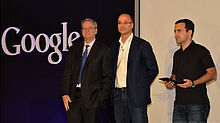When was Android Developing Program like Android Studio started?
A.
Android is an operating system - like that of iOS for Apple. The programme which we use to write or develop this Android Applications (App) to run on the Android OS is something like Android Studio.
So, definitely Android App writing programs have to be after the advent of Android as an Operating System - which is dated back to 1990's.
The App writing program like Eclipse was the software to write Android App before Android Studio. Below is a brief chronology of how these App writing software came about.
Extract from Wikipedia on Android Applications:
Applications ("apps"), which extend the functionality of devices, are written using the Android software development kit (SDK) and, often, the Java programming language that has complete access to the Android APIs. Java may be combined with C/C++, together with a choice of non-default runtimes that allow better C++ support;[59][60][61] the Go programming language is also supported since its version 1.4, which can also be used exclusively although with a restricted set of Android APIs.[62] The SDK includes a comprehensive set of development tools,[63] including a debugger, software libraries, a handset emulator based on QEMU, documentation, sample code, and tutorials. Initially, Google's supported integrated development environment (IDE) was Eclipse using the Android Development Tools (ADT) plugin; in December 2014, Google released Android Studio, based on IntelliJ IDEA, as its primary IDE for Android application development. Other development tools are available, including a native development kit (NDK) for applications or extensions in C or C++, Google App Inventor, a visual environment for novice programmers, and various cross platform mobile web applications frameworks. In January 2014, Google unveiled an framework based on Apache Cordovafor porting Chrome HTML 5 web applications to Android, wrapped in a native application shell.[64]
Android has a growing selection of third-party applications, which can be acquired by users by downloading and installing the application's APK (Android application package) file, or by downloading them using an application store program that allows users to install, update, and remove applications from their devices. Google Play Store is the primary application store installed on Android devices that comply with Google's compatibility requirements and license the Google Mobile Services software.[3][65] Google Play Store allows users to browse, download and update applications published by Google and third-party developers; as of July 2013, there are more than one million applications available for Android in Play Store.[66] As of July 2013, 50 billion applications have been installed.[67][68] Some carriers offer direct carrier billing for Google Play application purchases, where the cost of the application is added to the user's monthly bill.[69]
Due to the open nature of Android, a number of third-party application marketplaces also exist for Android, either to provide a substitute for devices that are not allowed to ship with Google Play Store, provide applications that cannot be offered on Google Play Store due to policy violations, or for other reasons. Examples of these third-party stores have included the Amazon Appstore, GetJar, and SlideMe. F-Droid, another alternative marketplace, seeks to only provide applications that are distributed under free and open source licenses.[3][70][71][72]
Ref:
https://en.wikipedia.org/wiki/Android_(operating_system)
